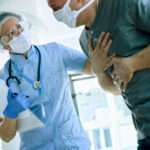Chest Wall Surgery in Mumbai
Are you searching for the best doctors for chest wall surgery in Mumbai? Dr. George Karimundackal, a noted thoracic surgeon is a highly skilled and experienced specialist in this field and is available in Mumbai.
Dr. George Karimundackal is Director – Surgical Oncology (Thoracic Surgery) at Nanavati Max Speciality Hospital, Mumbai. He and his team have vast experience in chest wall surgery.
Conditions of the chest wall can affect people of all age groups. Chest wall surgery may be performed to treat tumors, infection, traumatic injuries to the chest and congenital anomalies. Tumors of the chest wall may arise from the sternum or ribs or may be a metastatic deposit from tumors elsewhere in the body.
Chest wall surgery is complex and requires accurate planning for the resection (with good margins if it is for a tumor) and more so for reconstruction. The emphasis of this surgery is on removing the diseased portion of the sternum and/or ribs and reconstructing a stable and functioning chest wall, which protects the internal structures and allows the patient to breathe normally. Essentially, the aim is for the patient to have a better quality of life after surgery.
Types of Chest Wall Surgery
Chest Wall Tumor Excision:
As the name of the procedure suggests, it refers to the removal of benign or cancerous tumors of the chest wall. While removal of the tumor with a wide margin is essential for good survival, reconstruction of the chest wall is just as critical. A good, stable reconstruction should allow the patient to breathe normally while protecting internal organs. Some small defects may be left unreconstructed, while larger defects may need multiple layers of reconstruction. The bone is replaced with either medical cement or more recently, titanium rods and plates that are customized to each defect. Loss of muscle and skin may be replaced with tissue from the surrounding area or the patient’s thigh/ abdomen with the help of a plastic surgeon. Depending on the type of tumor, the patient may require additional therapy in the form of chemotherapy or radiation. Patients with chest wall tumors generally do well long term, with minimal complications in the post operative period.
 Rib Resection or Removal:
Rib Resection or Removal:
Sometimes the presence of an abnormally located or elongated rib can cause symptoms due to compression. This is particularly important in the case of the 1st rib and sometimes in the case of what is called a “cervical rib”. The adjacent blood vessels or nerves may get compressed by these anomalous ribs causing tingling numbness and weakness in the hands. The thoracic surgeon can perform a rib removal and alleviate the pressure on the nerves and vessels. The relief in symptoms is immediate and long lasting.
 Thoracoplasty:
Thoracoplasty:
Thoracoplasty is a surgical procedure that treats tuberculosis or empyema (accumulation of pus in the pleural space) or similar lung conditions. In this procedure, the thoracic surgeon removes a portion of the chest wall to collapse the affected lung and initiate healing. Thoracoplasty is also referred to as the collapse therapy of the chest wall.
 Chest Wall Trauma Repair:
Chest Wall Trauma Repair:
Severe chest trauma repair entails a comprehensive multidisciplinary approach to stabilize the chest wall, reconstruct the fracture and cosmetically cover the soft tissue loss. Treatment of complex chest wall trauma needs the co-ordinated involvement of the thoracic surgeon, anesthesiologist and pain management team, plastic surgeon, pulmonologist, and physiotherapist.
Choose the path to recovery with Dr. George Karimundackal's expertise
The success rate of chest wall surgeries
Success in chest wall surgery is measured based on various parameters including improved breathing, pain relief, chest wall stability and cosmesis. Chest wall surgery have a high success rate if they are performed by an experienced thoracic surgeon with an experienced team. Many patient related factors like the patients build and constitution, fitness level, co-morbidities, underlying lung condition also play an important part in deciding outcomes after such procedures. Careful evaluation and optimization by the treating team is of paramount importance. Patients and their family members should consult experienced thoracic surgeons to get a fair overview of the suitable surgical and options and their realistic outcomes.

Aftercare of chest wall surgeries
Post-surgery care plays a crucial role in the recovery of patients after chest wall surgery. A multidisciplinary team chalks out a comprehensive recovery plan that includes pain management, chest physiotherapy, surgical wound care, and detailed monitoring for likely complications such as breathing issues or infection.
Patients and their caregivers should follow the after-surgery instructions with due diligence and care. The instructions can include medication, physical activity and rehabilitation, and regular medical checkups. Post operative outcomes after chest wall surgery are usually very good, provided the patients and their caregivers adhere to the aftercare plan properly and in a disciplined manner.
Schedule your chest wall surgery consultation for a healthier tomorrow.
Frequently Asked Questions
Recovery from chest wall surgery depends upon the complexity of the surgery and individual patient factors. The patient should adhere to the postoperative instructions and visit the doctor for follow-ups at regular intervals to ensure a smooth recovery.On an average, the patient is discharged from the hospital within a week’s time and can return to routine activity by about a month.
The main expense in this surgery is related to the reconstructive material. However, a wide range of options exist for any defect and an informed and suitable choice can be made in each individual case, considering all factors.
Surgery for malignant tumors of the chest wall are elective procedures but should be expedited. Benign lesions can be scheduled as per convenience. Trauma surgery is generally emergent.
Some stage 4 esophageal cancer patients may live for more than a year. Around 20 out of 100 patients (or 20%) with stage 4 esophageal cancer will still be alive a year after diagnosis


 Rib Resection or Removal:
Rib Resection or Removal: Thoracoplasty:
Thoracoplasty: Chest Wall Trauma Repair:
Chest Wall Trauma Repair: